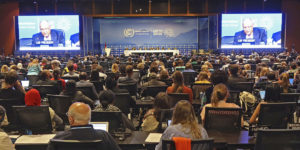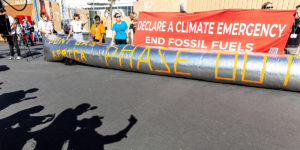Post COP27 Update: November 2022
- Summary
- COP27 outcomes:
Loss and Damage Fund | Fossil fuels | The Amazon, leadership, and agriculture | Australian perspective and where we stand - What needs to improve:
Fossil fuel delegates should not be welcome at any COP | Responsible corporate representation | Subsidies must stop and investment pledges honoured | Business alignment - Post COP27 – what we can do:
Education | Frameworks to set you up for success | Business case for sustainability | Your voice is your asset - A better future is possible
- Our writers
- How we can help – talk to us
Missing out on our sustainability news? Subscribe to our newsletter right here.

COP 27: Climate reparations or a small plaster on a gaping wound?
By Harry Knox, Clare De Silva, Dr Sepideh Moshrefi, Luke Huels
Summary
With pressures stemming from the war in Ukraine, a post-COVID world, and the global energy crisis, COP27 in the Egyptian city of Sharm El-Sheikh took place amid a constrained geopolitical lens. Slated before the event as the ‘implementation’ COP, where the world would move ‘from negotiation to implementation and where words (would be) translated to actions‘ it is clear now that this has not come to pass.
The breakthrough at the conference was on loss and damage, an important piece of global climate policy that should help provide more security for developing countries hardest hit by the effects of climate change. Unfortunately COP27 was again derailed from meaningful progress by fossil fuel-producing countries and lobbyists which resulted in less implementation and more state-level greenwashing. Current policies have us on track for a 2.8°C warming scenario, with models showing that there is only a 38% chance of keeping warming under 1.5°C.
COP27 outcomes
Loss and Damage Fund

While COP26 focused efforts towards climate change mitigation in the form of a ‘phase down’ of coal use, methane reduction pledges, and increased protection of forests, COP27 addressed the long standing gap in global climate adaptation through the approval of a Loss and Damage Fund.
The function of the fund is to provide a financial support mechanism for developing nations suffering climate-related loss and damage: an element missing from international climate policy for 30 years. The establishment of the fund was seen as a breakthrough for developing countries that are most at risk from the effects of rising sea levels and increased extreme weather events.
While island nations hailed the fund as a way to restore trust in the international climate negotiation process, a decision was not reached regarding which countries will contribute, though it seems understood that industrialised nations and international financial institutions will need to contribute more to help developing nations adapt to human-induced climate catastrophes.
In a symbolic effort, Belgium, Austria, New Zealand, Germany, Canada and Ireland made contributions at COP27. However, these contributions to issues expected to represent 400 billion USD by 2030 totalled less than USD 200 million combined. Additionally, one of the core criticisms in relation to the effectiveness of funds such as these is the lack of equitable contributions and the failure to meet existing financial contribution goals: the previously set goal of USD 100 billion annually in climate finance by 2020 fell short by 20%. It is furthermore unclear how funding commitments will successfully aid climate solutions with ongoing contradictions from substantially larger fossil-fuel subsidies.
The COP27 focus on funding begs the question: what will be different this time around?
Fossil fuels
One of the most disappointing aspects of COP27 was the inability of parties to agree to put pressure on fossil fuel-producing countries. India unsuccessfully proposed the phase down of all fossil fuels, not only coal, but was blocked by oil-producing nations such as Saudi Arabia which proposed a circular carbon economy placing carbon capture and storage technology (CCS) as a cornerstone of their net-zero by 2060 goal. This policy allows the continued sale of oil.
In the end, weak language from COP26 carried over into the COP27 final text with the inclusion of a ‘phasedown of unabated coal power and inefficient fossil fuel subsidies’. This can only be viewed as a missed opportunity to put pressure on both oil and gas producing nations.
There were 636 fossil fuel lobbyists at COP27 – 25% more lobbyists than COP26 – and with oil and gas-producing countries receiving the protection of the Egyptian Presidency there was little progress in relation to fossil fuel phase-out or the ratcheting up of Nationally Determined Contributions (NDC). This does not set the stage well for COP28 to be held in the United Arab Emirates with fears that oil-producing nations’ influence will stymie progress again in 2023.
If the world is to keep global temperatures below 1.5°C, 60% of current oil and gas reserves and 90% of coal reserves must stay in the ground. Therefore language such as ‘phasedown’ can only be seen as an abject failure by international policymakers.
The Amazon, leadership, and agriculture
Amazon:
Arguably, COP27 saw deliberate and obvious attempts to broaden horizons. Increasingly the degradation of rainforests and oceans are central concerns alongside atmospheric carbon. Brazil will work towards zero deforestation by 2030 and the Forest and Climate Leaders’ Partnership (FCLP) was formally launched. Meanwhile, strong discourse endures regarding the importance of democratic mindsets in climate action, reinforced international collaboration, and the need to platform marginalised voices.
Leadership:
The about turn in Brazilian environmental policy shows the importance of domestic elections in international treaties with similar, stark changes occurring in Australia since the 2022 federal election. Unfortunately leadership from the fossil fuel lobby was strong at COP27 whilst global heads of state were less impressive. Xi Jinping (China), Narendra Modi (India), Vladamir Putin (Russia), Justin Trudeau (Canada), and Anthony Albanese (Australia) were not in attendance. Rishi Sunak (United Kingdom) and Joe Biden (USA) were late arrivals. The lack of meaningful targets is not unsurprising.
Agriculture:
The text of COP27 included agriculture with food and water security highlighted as key components of climate change mitigation. Unfortunately food systems, consumption patterns, or how farming practices might be improved has been omitted despite agriculture contributing between 21-37% of global emissions. Agricultural use accounts for 55% of Australia’s land mass. Regenerative practices, as well as a reduction in livestock populations, has the potential to have meaningful emissions reductions while simultaneously creating carbon sinks.
Australian perspective and where we stand
After a decade as a political pariah Australia rejoined the international climate fold with an increased emissions reduction target of 43% by 2030. Although an improvement on the previous government’s target of 26-28%, this new target falls short of Australia’s required fair share of between 57-60%. The country, however, has joined the Global Methane Pledge, the Green Shipping Challenge, the Forests and Climate Leaders’ Partnership, and the International Mangrove Alliance for Climate. Australia also bid to co-host COP31 with Pacific Island nations whose support may well depend on Australia ending new fossil fuel subsidies.
Based on current domestic policies most countries are not on track to meet their 2030 emissions reductions targets; even if current targets are met, temperatures will still rise 2.6°C by 2100. Additionally, with emissions projected to reach a record high in 2022 there is a greater, more urgent context for all organisations, people, and governments to act decisively now.
What needs to improve

A fund for loss and damage is important, but without a steep decline in fossil fuel usage it is a band-aid solution.
Those who emit the least suffer the worst impacts of climate change. Thus, reparations from the largest emitting developed countries are a necessary and a commendable development coming out of COP27, ensuring some accountability. However, without stronger targets on emissions reductions at an inter-governmental level, the Loss and Damage Fund seems unlikely to stop damage at the source, rather, allowing countries to maintain the status quo with lacklustre reductions.
Martin Kaiser, the Executive Director of Greenpeace Germany, described the agreement on the Loss and Damage Fund as a ‘small plaster on a huge, gaping wound’, a fitting description of the short-term mindset of governments whose lack of mitigation approaches are seeing the world’s collective target hurtling dangerously towards a 2°C scenario. (Want to understand the difference between a 1.5 and 2.0°C scenario? The ABC’s environment reporter, Nick Kilvert, sums it up here.)
As such, at COP28 we urge our government and businesses to push for stronger emissions reduction targets with clear interim targets, sector-wide steps to achieve targets, and strong penalties for those who do not comply.
Fossil fuel delegates should not be welcome at any COP
With the sheer number of lobbyists, it is not surprising that COP27 had weak outcomes which has resulted in an even more dismal outlook for those most impacted by climate change. Ironically, some of these most impacted countries, such as African nations Kenya, Congo, Angola, and Namibia, were represented by fossil fuel lobbyists as part of their national delegate teams, highlighting the insidious nature in which fossil fuel lobbyists operate.
‘Today we are being colonised by the impacts of climate change. The big polluters are the new colonisers,’ Umi Sengebau, the Palau Minister of the Environment stated, ‘They need to step up and change their ways to ensure the more vulnerable nations have a chance.’
Responsible corporate representation
COP27 attendees rightfully bemoaned the use of Coca-Cola as a major sponsor considering their role in the global plastic crisis. If corporations are to be represented at COP28 a clearer picture of each entity’s transition to low emitting business models must be a requirement for participation.
By allowing the infiltration of fossil fuel interests into COP discussions progress slows; corrupt systems which have allowed climate change to run rampant are upheld. Reducing the influence of these lobbyists at future COPs is imperative for the safety and health of our planet.
Subsidies must stop and investment pledges honoured
COP27 recognises the phasing down of unabated coal power and phasing out of inefficient fossil fuel subsidies. Fossil fuels are the root of the climate crisis. Accordingly we need to end the debate about their roles in the future with a definitive end to their subsidies using the money to instead finance renewable energy solutions and natural ecosystem regeneration.
Moreover the failure to meet the previous pledge of US$100 billion per year by 2020 raises serious concerns regarding the provision of necessary financial, technology transfer, and capacity-building support for developing countries: support that is sorely needed to keep the global temperature rise well below 2°C as well as bridge the gap between current levels of adaption and levels required to resist the adverse effect of climate change.
The knowledge that large swathes of current financial contributions have been made in the form of loans further entrenching debt-trap diplomacy exacerbates such concerns and shows that even with considerable progress the COP process still lacks accountability. The outcomes of the Paris Agreement exemplifies the severity of the problem. Many countries continue to under deliver on promises with little recourse.
Business alignment
The call to shareholders of multilateral development banks and international financial institutions to align their development policies and practices demonstrates ineffective or insufficient collaboration and coordination between private sectors and governments. During this critical decade of action we need collaborations and aligned policies and practices of private sectors and governments to achieve the Paris Agreement goals.
Post COP27: what we can do

Education
You are not helpless in the fight against climate change, but it can be daunting to start the process and understand where you and your organisation can make the greatest impact.
Here are a few ways to get started and to spur on positive action.
- Try the Climate Fresk Workshop: a three-hour gamified system and collaborative workshop which provides an overview of climate change and what is at stake;
- Read AR6,I (IPCC report published in 2021);
- Use the Climate Council Resources online;
- Take a look at the Drawdown Climate Solutions Course.
Frameworks to set you up for success

At Pangolin we advocate a three-step process to reduce greenhouse gas emissions:
Measure first.
Implement reductions,
Offset remaining emissions.
Measure your emissions with a Greenhouse Gas Assessment, also known as a Carbon Footprint, utilising the GHG Protocol framework.
Next, put a plan in place to reduce your emissions. Look at your business’ emissions hot spots and create a reduction strategy.
 Go further to achieve long-term emissions reductions. For example:
Go further to achieve long-term emissions reductions. For example:
- Investigate formal certifications such as Climate Active carbon neutrality;
- Learn about net-zero targets via the Science Based Targets initiative.
Finally, for emissions you cannot eliminate, invest in globally certified climate solutions via carbon offsets.
Emissions are one part of an extraordinarily complex picture of your organisational impacts. We urge businesses to consider the wider consequences of their activities on the environment. Implement frameworks that help you to better understand and target your impacts. For example:
- B Corp certification;
- Environmental, Social, and Corporate Governance (ESG) strategies;
- Task Force on Climate-Related Financial Disclosures (TCFD) framework.
Business case for sustainability
Creating a business case for sustainability influences decision making and behaviours at every level of your organisation. A compelling business case recognises the varying degrees to which people understand the issues arising from climate change. Clear, cogent plans for meaningful change should take many factors into account. Here are a few:
- Moving away from fossil fuels;
- Reducing consumption of virgin materials;
- Switching to 100% renewable electricity and, if possible, investing in clean energy generation;
- Improving and investing in energy efficiencies;
- Reducing non-energy related emissions;
- Reviewing your supply network and including sustainability in your supply chain policy;
- Encouraging supply chain partners to review and reduce their own emissions;
- Ensuring your financial institutions are making the right choices, e.g. not investing in fossil fuel projects;
- Protecting biodiversity and natural carbon sinks through your offsetting choices;
- Initiating action. Showing climate leadership. Choosing to set an example.

Your voice is your asset
Demand meaningful action from all levels of government; protests, petitions, surveys, and simply calling your local representative can make a difference.
- It is important to remember that accountability goes beyond greenhouse gas emissions. Prioritise a just transition to inter-generational equity, human rights, gender equality, racial equity, and cultural integrity.
A better future is possible
International efforts to address global catastrophes over recent years prove that massive, rapid mobilisation of finances and efforts is possible. A brief journey on the Internet through post-COP discourse is testimony to the frustration and tribulation of concerned stakeholders. Whether participating at COP27 or watching from the sidelines people are passionate and determined.
‘There is no point of no return; and so we keep on.’ Arne Naess, Environmental Philosopher
Our writers
 Harry Knox
Harry Knox
Consultant | Climate Solutions
Harry helps organisations transition towards a sustainable, accountable future. He has had extensive consulting experience across a range of climate change and sustainability services, including environmental, social, and corporate governance (ESG). Read more about Harry.
 Clare De Silva
Clare De Silva
Senior Consultant
Clare helps our clients through the steps of a Carbon Footprint and to undertake Life Cycle Assessments. She has a particular interest in the commercial benefits of a circular economy. Read more about Clare.
 Dr Sepideh Moshrefi
Dr Sepideh Moshrefi
Consultant | Climate Solutions
Sepideh provides a range of services for Pangolin’s clients including Carbon Footprints (Greenhouse Gas Assessments), Climate Active carbon neutral certification consulting, Life Cycle Assessments, and Science Based Targets.
 Luke Huels
Luke Huels
Consultant | Climate Solutions
Luke is an Infrastructure Sustainability Accredited Professional and Climate Active Registered Consultant. His expertise includes policy and systems thinking. Read more about Luke.
